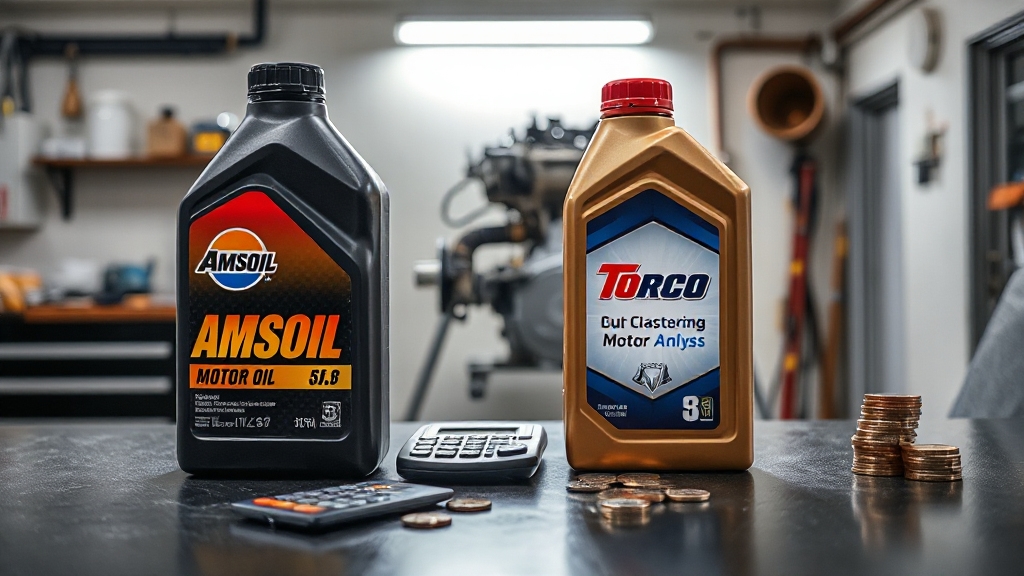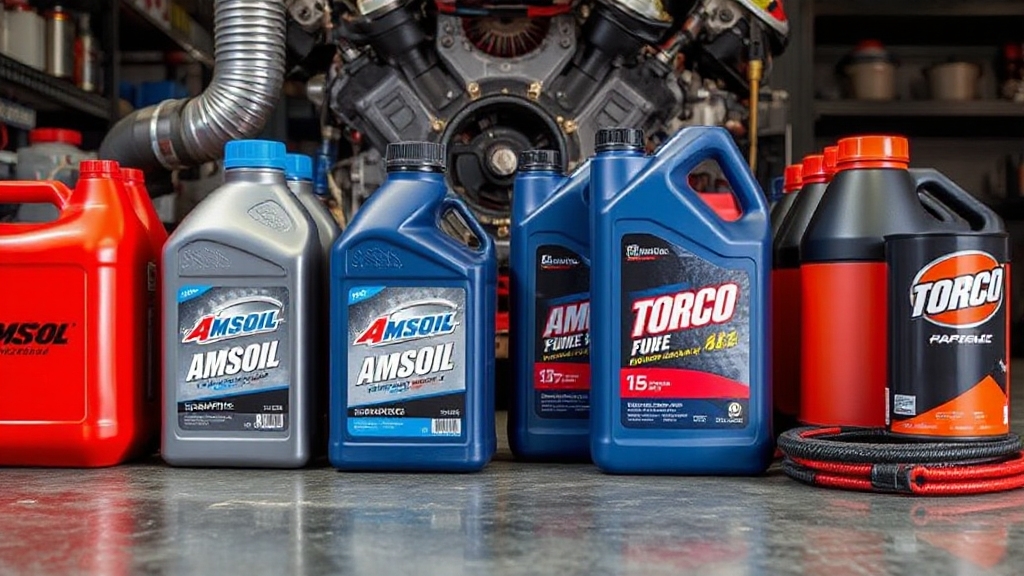Physical Address
304 North Cardinal St.
Dorchester Center, MA 02124
Physical Address
304 North Cardinal St.
Dorchester Center, MA 02124

If you need synthetic motor oil that excels in thermal stability, shear resistance, and extended engine protection, AMSOIL stands out with its proven longevity and high-performance formulations.
Torco offers cost-effective options that perform well in niche racing and extreme conditions but can thin under shear stress. Your choice hinges on balancing budget, operating conditions, and engine demands.
Exploring deeper will clarify which oil aligns best with your vehicle’s specific performance priorities and service needs.
When evaluating brand reputation and industry recognition, AMSOIL and Torco stand out for distinct reasons rooted in their histories and market focus.
AMSOIL, founded in 1972 by Al Amatuzio, established itself as a pioneer in synthetic motor oils, gaining broad recognition through extensive certifications like API and ILSAC.
Its distribution via a robust dealer network guarantees wide accessibility, reinforcing its premium reputation. However, some users express skepticism due to AMSOIL’s policy that allows anyone to become a dealer, which affects perceptions of exclusivity.
Torco, emerging in the early 2000s, targets high-performance sectors such as racing and aerospace, earning respect through specialized product performance and direct sales channels.
Although Torco’s certifications are less publicly emphasized, its products receive acclaim in demanding applications, including UAV engines.
Both brands maintain loyal customer bases and industry partnerships, but AMSOIL’s longer market presence grants it a more traditional and expansive recognition profile compared to Torco’s niche-focused standing.
Understanding the reputations of Amsoil and Torco sets the stage for a closer examination of their product compositions and synthetic qualities.
Both use synthetic base oils—Amsoil favors polyalphaolefin (PAO) or polyalkylene glycol (PAG), while Torco emphasizes a high-viscosity-index synthetic gear oil (SGO).
You’ll notice Amsoil Severe Gear maintains superior shear stability and cold-temperature performance, retaining viscosity under stress better than Torco’s SGO, which thins considerably under shear.
Both incorporate advanced additive packages, including anti-wear agents, corrosion inhibitors, and friction modifiers, but Torco excels in foam resistance, vital in dry sump systems.
Users have noted the importance of oil performance in high-horsepower applications when selecting between these oils. Their manufacturing processes guarantee rigorous quality control and consistent raw material sourcing.
When evaluating Amsoil and Torco, you need to focus on how each oil reduces engine wear under stress and maintains stability at high temperatures.
Amsoil’s full synthetic formulation generally offers superior thermal resistance, which helps protect critical engine components during extreme heat.
In contrast, Torco performs well but may not match Amsoil’s consistency in wear reduction during prolonged high-temperature exposure. Additionally, Torco T4R is likely the specific oil used by dealers for its performance in harsh racing conditions.
Although both AMSOIL and Torco offer lubricants aimed at wear reduction, AMSOIL demonstrates superior performance through its exceptional shear stability and advanced additive technology.
You’ll find AMSOIL maintains viscosity under mechanical stress, preserving a strong lubricating film that minimizes metal-to-metal contact. Torco, however, thins excessively post-shear, compromising wear protection.
AMSOIL’s additive package chemically forms durable anti-wear films, extending component life more effectively.
Additionally, AMSOIL products offer compatibility with a wide range of heavy-duty applications, ensuring consistent performance and multi-functional fluid benefits across various vehicle types.
Because high-temperature stability directly impacts engine longevity and efficiency, choosing a lubricant that resists oxidation and thermal degradation is critical.
AMSOIL excels here with superior oxidation resistance, demonstrated by its Thin-Film Oxygen Uptake Test induction time exceeding 500 minutes. This high resistance curtails sludge and varnish formation, maintaining engine cleanliness and consistent viscosity under extreme heat.
In contrast, Torco’s synthetic lubricants lack detailed oxidation and thermal stability data, making their high-temperature performance less certain.
AMSOIL’s formulation effectively prevents thermal degradation, reducing friction and wear while protecting components during sustained high-temperature operation. This guarantees continuous engine protection and fuel efficiency.
If you prioritize robust high-temperature stability and deposit prevention, AMSOIL offers a technically proven advantage over Torco in safeguarding engine performance and durability.
Price plays a critical role in choosing between AMSOIL and Torco oils, especially when balancing performance against budget constraints.
AMSOIL’s products are known for their shear-stable viscosity improvers, which enhance durability under high-stress conditions. Your choice hinges on whether you prioritize superior engine protection and longer oil life or immediate cost savings.
Racing motor oil is formulated for frequent changes and is tailored to withstand extreme conditions, which can influence the overall cost efficiency of using such oils in racing applications due to their frequent oil changes requirement.
Choosing between premium protection and extended oil life versus upfront savings defines your oil selection strategy.
You’ll find enthusiast forums highlight Amsoil’s superior engine protection in racing scenarios, while Torco earns praise for clutch feel and durability under extreme conditions.
Racing users often highlight Torco’s reliability in harsh environments, such as desert conditions or high-altitude UAV engines. Amsoil’s Signature Series 0W-30, known for its superior performance, remains a popular choice among high-performance vehicle owners.
Analyzing community feedback reveals a clear split based on specific application demands and performance priorities.
How do Amsoil and Torco stack up in enthusiast forums where real-world performance and transparency matter most? You’ll find Amsoil praised for consistent quality, smoothness, and extended drain intervals, reinforcing trust through product integrity.
Torco’s transparency in additive disclosure gains respect, but some users question its formulation consistency due to third-party sourcing. Notably, Torco SX-8 is composed of Group III and Group III+ base oils, which some users appreciate for its clarity on base oil composition.
Key forum insights include:
Forums emphasize nuanced trade-offs, reflecting both brands’ refined formulations.
Many racers weigh the trade-offs between Amsoil and Torco by examining real-world performance and cost-effectiveness.
You’ll find Amsoil’s full synthetic formula often favored for longevity and engine protection, despite its roughly 50% higher price. Torco’s semi-synthetic oils deliver competitive clutch feel and better humidity resilience, appealing in varied environments.
Consider that oil shear resistance can impact oil performance, especially under high operating temperatures common in racing. Community feedback highlights minimal performance difference when oil changes are frequent, prompting cost-conscious racers to lean toward Torco.
| Feature | Amsoil | Torco |
|---|---|---|
| Composition | Full synthetic | Semi-synthetic |
| Cost | ~50% higher | More affordable |
| Humidity Performance | Less resistant | Better resilience |
| Clutch Feel | Standard | Noted as superior |
| Longevity | Superior | Adequate |
Your choice depends on balancing synthetic quality against budget and environmental factors.
Durability under extreme conditions often defines an oil’s true value, and both AMSOIL and Torco deliver notable performance in this arena.
Users consistently note AMSOIL’s superior resistance to viscosity breakdown and enhanced equipment longevity, especially in hydraulic and transmission systems.
Many users also emphasize the importance of quality control in oil production, which AMSOIL rigorously follows to ensure product consistency and performance.
This is supported by AMSOIL’s superior viscosity retention across a wide temperature range, which helps maintain engine protection longer than many competitors.
Torco performs well initially but shows limitations in shear stability during extended use. You’ll find AMSOIL excels in cold-temperature starts and high-stress endurance testing, maintaining viscosity where others thin out.
Choosing AMSOIL offers measurable durability advantages under demanding conditions.
While both Amsoil and Torco serve high-performance environments, their application suitability diverges based on engine type and operating conditions.
Torco excels in niche racing uses, such as 4-wheelers and military drones, where its SR-5 lubricant withstands extreme weather and harsh environments. It also offers superior clutch feel and wear protection in specialized racing contexts.
Torco oils have been tested globally and are considered the best for drone engines across various climates, demonstrating their reliability in diverse and demanding conditions.
Conversely, Amsoil provides broad versatility across automotive, motorcycle, and industrial engines, with a higher viscosity index and enhanced cold-start performance. Its synthetic formulations support heat management and extended engine life, making it ideal for varied heavy-duty applications.
When selecting between these oils, consider Torco’s targeted performance in critical, environmental extremes versus Amsoil’s extensive reliability across diverse engine platforms and operating conditions.

When selecting between Amsoil and Torco, you need to weigh your engine’s specific demands against each oil’s performance profile and cost structure.
Amsoil excels in high-stress environments with superior engine protection, full synthetic formulation, and extended drain intervals. It provides up to 75% more engine protection than industry standards, making it a top choice for those seeking maximum wear resistance.
Torco offers cost-effective solutions, ideal for moderate use or frequent oil changes where budget constraints dominate. Consider these factors:
Matching oil choice to your usage guarantees ideal protection without unnecessary expense, balancing performance needs with financial practicality.
You can use synthetic oils with older classic cars, but you need to guarantee compatibility with vintage engine materials. High-zinc formulations help protect flat-tappet camshafts common in classics. Oils designed for modern engines may lack certain anti-wear additives vital for older designs.
Also, rust and corrosion inhibitors are important if you store your classic car long-term. Always check the specific oil’s additive package and compatibility before switching to synthetic products.
You shouldn’t use Torco oils in electric vehicle thermal systems because they’re formulated for traditional combustion engines, not EV-specific needs.
EV thermal systems demand lubricants that manage high voltage, prevent electrostatic buildup, and resist corrosion, especially on copper components.
Torco oils lack these specialized properties and haven’t been proven to meet EV safety standards, so relying on them could compromise system performance and longevity, posing potential risks to your electric vehicle.
Imagine guiding precious liquid through a guarded pathway, ensuring it never seeps into forbidden streams.
You store used oil in labeled, leak-proof containers and deliver it to certified recycling centers or hazardous waste facilities if mixed with contaminants. Avoid pouring oil into drains or soil. Drain filters thoroughly before recycling scrap metal.
Following these protocols, you protect ecosystems and comply with regulations, fostering responsible disposal practices for both Amsoil and Torco oils.
You’ll find that AMSOIL holds ISO 14001:2015 certification for its Environmental Management System, verified by NSF International, reflecting rigorous environmental standards.
AMSOIL also pursues carbon neutrality and recycling initiatives. In contrast, Torco lacks publicly available environmental certifications or formal sustainability programs.
If environmental credentials matter to you, AMSOIL clearly demonstrates commitment through recognized certifications and proactive ecological management, whereas Torco focuses mainly on performance without documented environmental certifications.
If you’ve ever struggled with engine wear at startup, you’ll appreciate oils with superior cold-flow.
Amsoil’s synthetic formulations offer up to 16% better low-temperature viscosity and reduce startup wear by maintaining oil fluidity when it thickens. Torco’s data on cold-start is limited, though it excels under racing stress.
Choosing between Amsoil and Torco is like selecting the right tool for a precision engine each excels in specific conditions.
For instance, Amsoil’s synthetic formulation offers proven longevity, akin to a craftsman’s trusted wrench, while Torco shines in high-performance scenarios, much like a specialized torque driver.
By analyzing your engine’s demands and budget, you can pinpoint which oil delivers peak protection and efficiency tailored to your unique needs.
Last update on 2026-01-17 / Affiliate links / Images from Amazon Product Advertising API